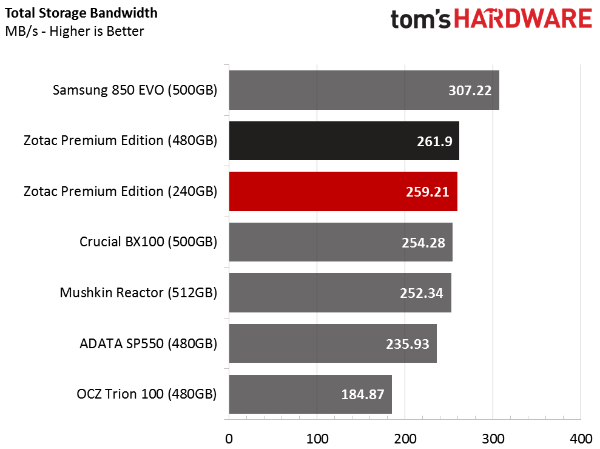Zotac Premium Edition SSD Review
Armed with Phison's new v.1.6 firmware for the S10 processor and low-cost flash, Zotac takes aim at the mainstream and gamer SSD markets.
Why you can trust Tom's Hardware
Real-World Software Performance
PCMark 8 Real-World Software Performance
For details on our real-world software performance testing, please click here.
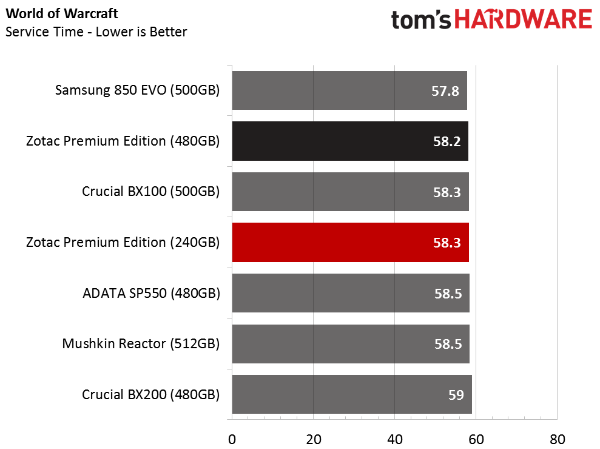
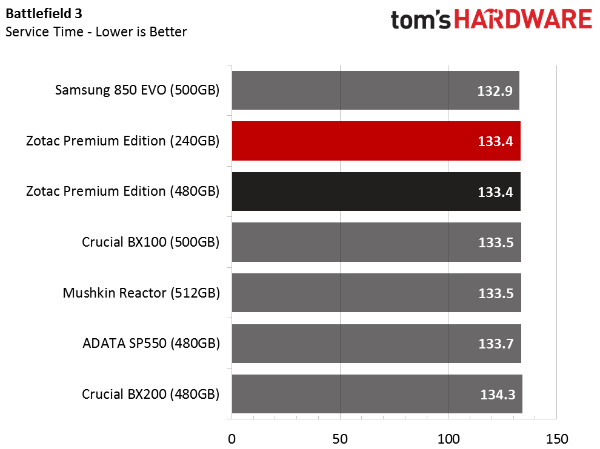
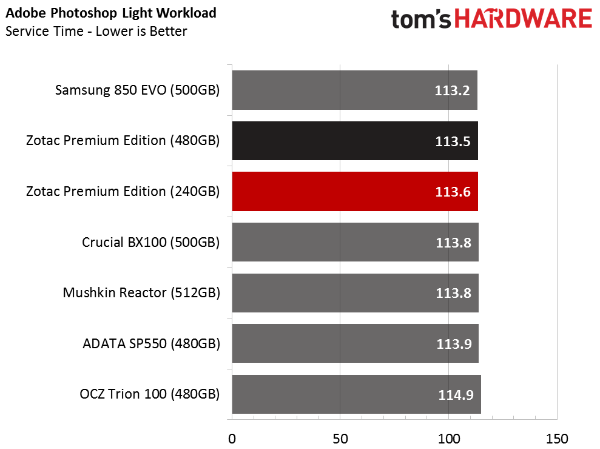
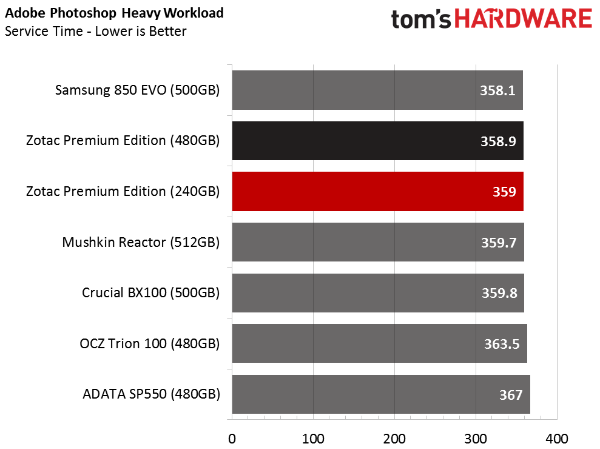
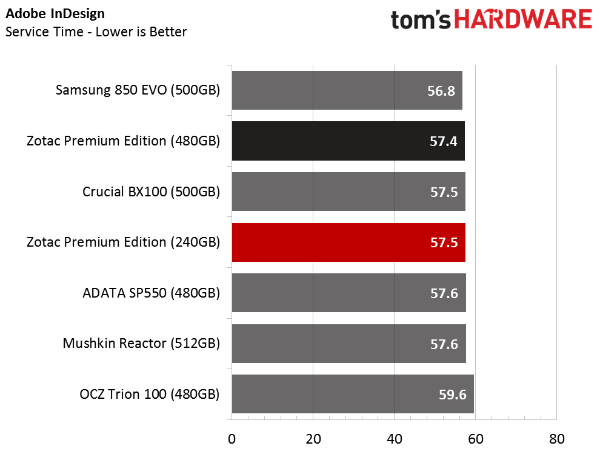
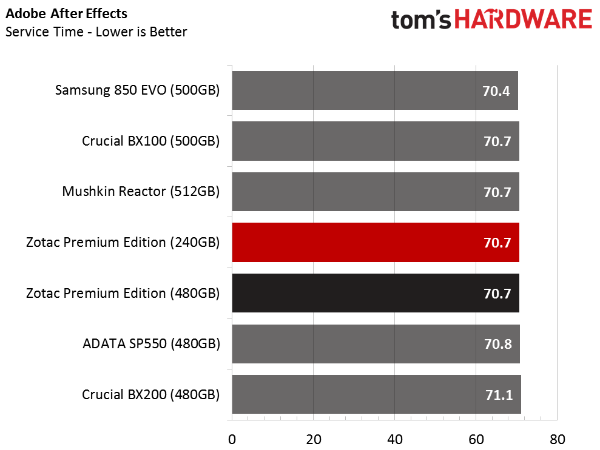
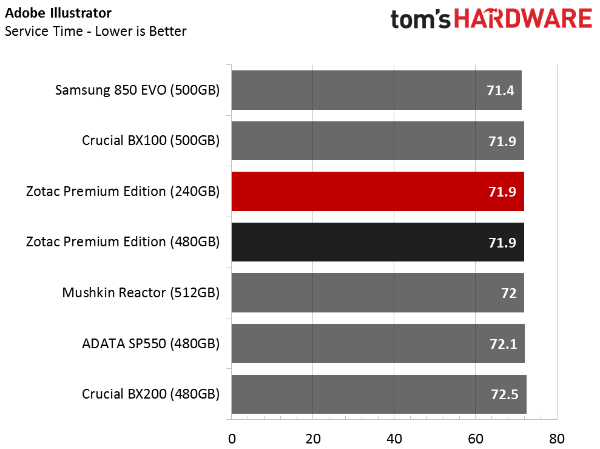
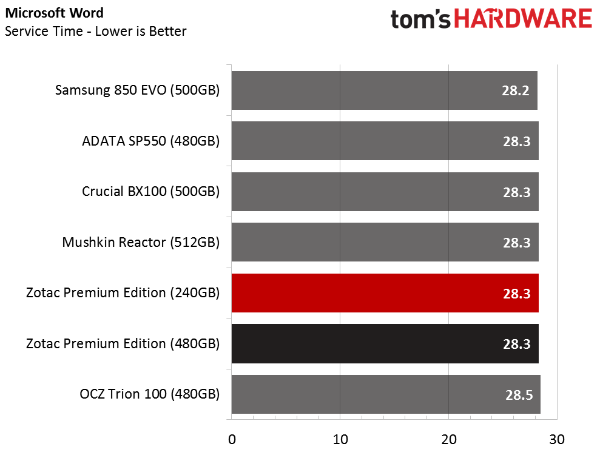
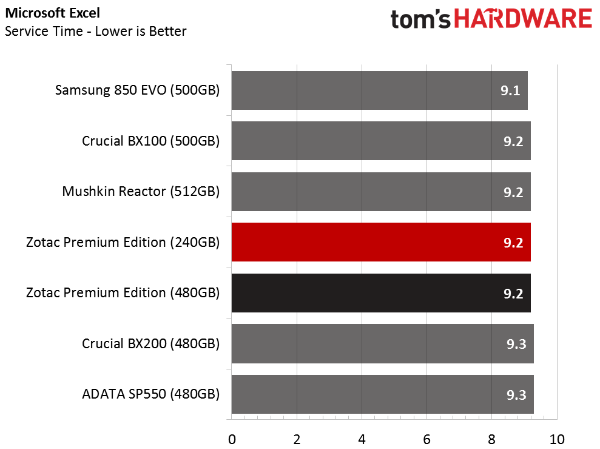
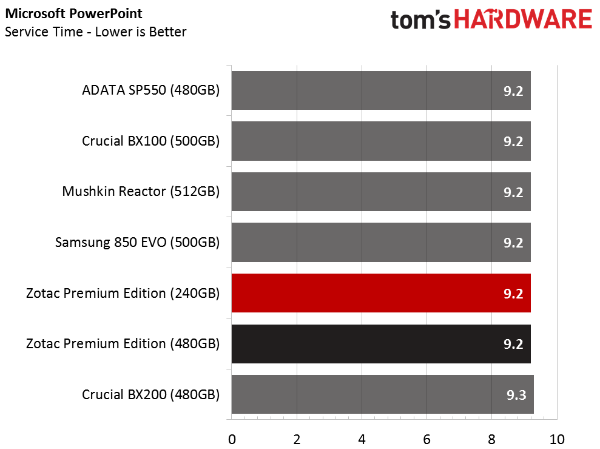
Zotac's Premium Edition 480GB closes the gap between other SSDs and Samsung's 850 EVO at its capacity point. There is not a lot of separation from one low-cost drive to another in these charts, but it's important to know that, over time, the differences do add up.
Total Storage Bandwidth
Here we see the tests combined and the results displayed in throughput. The highest-capacity Premium Edition SSD is right on the heels of the 850 EVO 500GB, and the same can be said about the smaller 240GB model. This is really surprising because high-density 128Gb dies have otherwise turned 256GB SSDs into the new 128GB SSDs, with less than desirable performance. There are few 256GB-class SSDs that we would consider purchasing because they give up so much speed compared to products in the next-highest capacity class.
PCMark 8 Advanced Workload Performance
To learn how we test advanced workload performance, please click here.
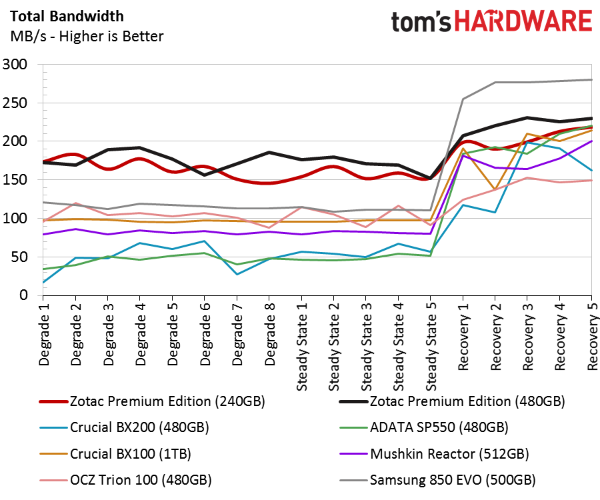
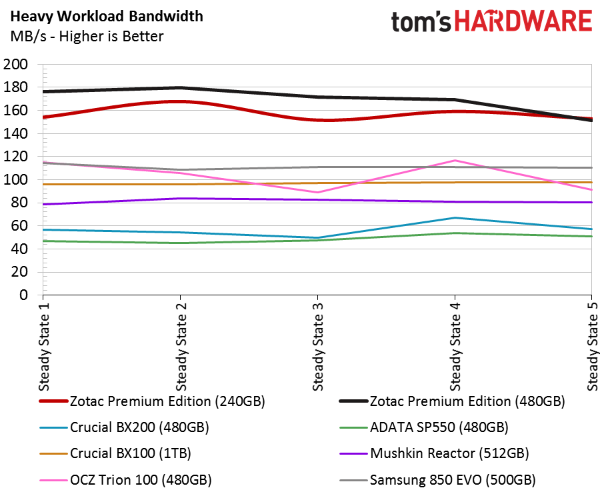
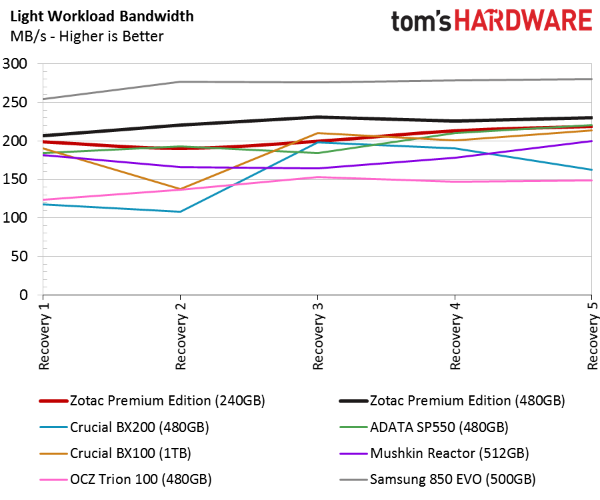
Under heavy workloads, the Premium Edition SSDs are the best option available for the price. Their performance really is comparable to other mainstream SSDs, though without an emulated SLC layer to increase burst performance, they fall back into the pack with other low-cost products.
This is where Samsung's 850 EVO stands out, which is why it continues earning praise from non-professional users who own it.
Access Time Test
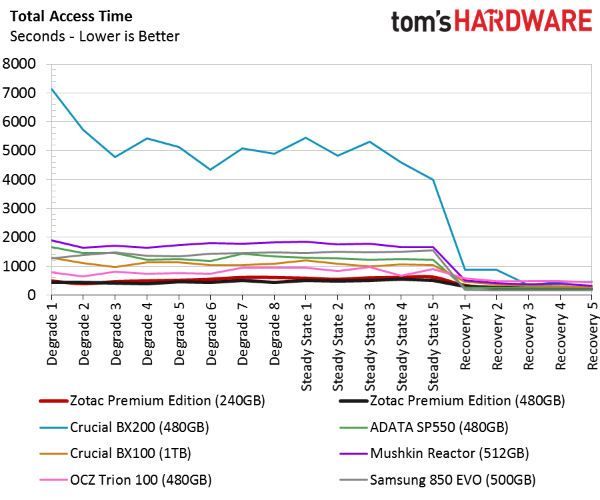
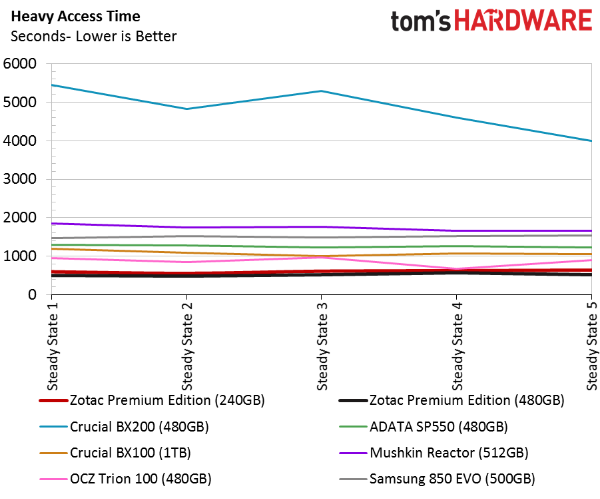
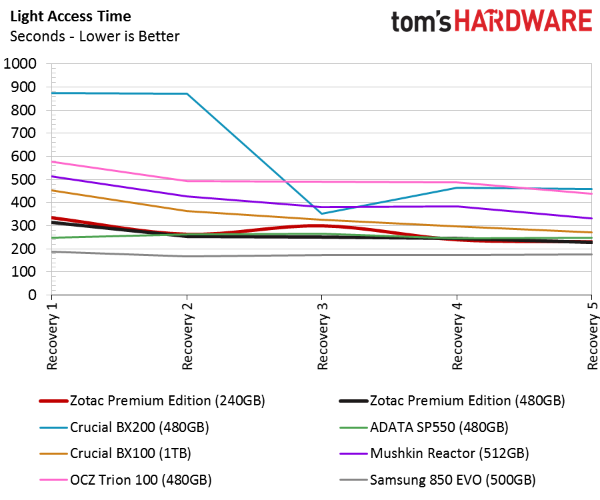
The access time results show a near mirror of the throughput tests. The Premium Edition SSDs whip through the heavy load iterations with a consistent flow that doesn't deviate from the path until the task eases up. They then settle in under moderate workloads and lead many of the other low-cost SSDs. Samsung's 850 EVO 500GB still performs a little better under light workloads, in part due to its TurboWrite feature (a marketing term for emulated SLC cache).
Get Tom's Hardware's best news and in-depth reviews, straight to your inbox.
Notebook Battery Life
For more information on how we test notebook battery life, click here.
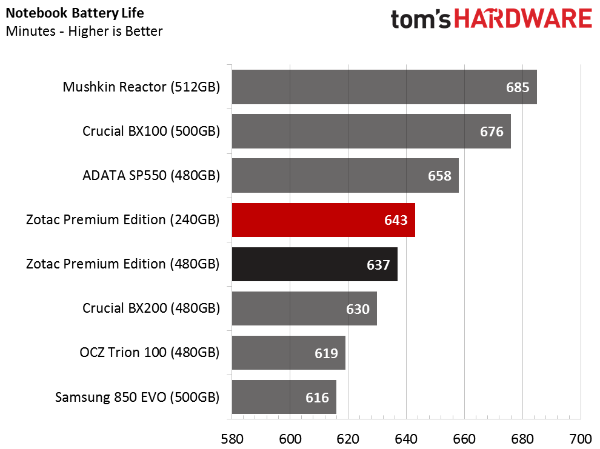
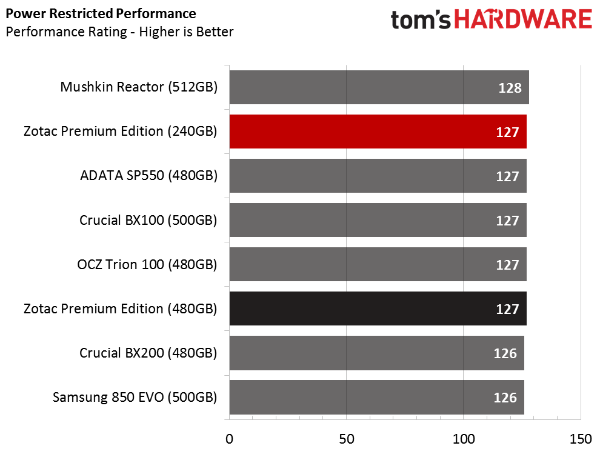
The Zotac Premium Edition SSDs fall into the middle of the pack when it comes to notebook battery life testing. The value-oriented drives we're including in the charts offer some of the best power numbers, often overshadowing high-performance SSDs in this discipline.
On notebook battery power, system buses run at reduced clock rates in order to minimize power consumption. This creates a bottleneck for many of the system components, and some SSDs adapt better than others. All of the drives in today's chart perform well though, delivering roughly the same performance.
Current page: Real-World Software Performance
Prev Page Performance Test Results Next Page Conclusion
Chris Ramseyer was a senior contributing editor for Tom's Hardware. He tested and reviewed consumer storage.
-
Onus If I needed another SSD, I'd definitely put this one on my short list. I have a question though, that pertains more to testing in general than to this specific drive, but it certainly applies: will two identical SSDs (including same firmware, e.g. two units bought off the shelf at the same time) have identical performance? We know that the "silicon lottery" affects timing and overclocking limits on RAM; does it also play a role in SSD performance? I would think not, but if so, would love to know why, and how much. Thanks.Reply
-
icepick314 I don't know...Reply
Samsung Evo Pro 1TB with 10 year warranty is around $400-$450...
I say splurge a little and get the capacity, performance, and 10 years of worry-free storage... -
salgado18 ReplyI don't know...
I say if you want a drive for 10 years, wait for the new tech to arrive this year, a lot faster (over 3x) and with new connections (SATA is old already).
Samsung Evo Pro 1TB with 10 year warranty is around $400-$450...
I say splurge a little and get the capacity, performance, and 10 years of worry-free storage... -
LordConrad Just out of curiosity, how do these drives compare to the Samsung 850 Pro on notebook battery life?Reply -
Onus Yes, please add power consumption. The Samsung drives are remarkable in how little idle power they use compared to competitors (I believe it is typically 30%).Reply -
g-unit1111 Reply17403001 said:Just out of curiosity, how do these drives compare to the Samsung 850 Pro on notebook battery life?
Yes. I would be curious about this as well. This looks like a fairly nice drive and $140 for 480GB and Toshiba NAND looks pretty solid and a decent competitor to Samsung. -
shrapnel_indie Well, I wonder how TH would rank Toshiba's Q300 offerings against this and Samsung... from what I seen elsewhere their Q300 series puts up quite a fight with Samsung.Reply -
CRamseyer Thanks for all of the excellent questions.Reply
We tested the Q300 Pro (MLC version) and the review is in queue. We do not have the Q300 drive with TLC.
On the notebook battery life front, we measured the 850 Pro 512GB at 657 minutes. There are so many good drives available now and such a wide divide between the high performance and low cost models that we charts the drives separate.
There are size limits to for the performance charts. At some point I plan to list a couple of hundred drives in massive charts so everyone can see how they all stack up.
The 850 Pro is the only model from Samsung with a 10 year warranty. The 850 EVO carries a 5-year warranty. The SanDisk Extreme PRO also carries 10 years of coverage.
